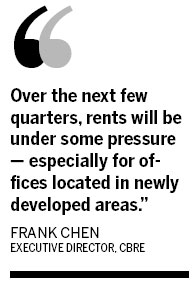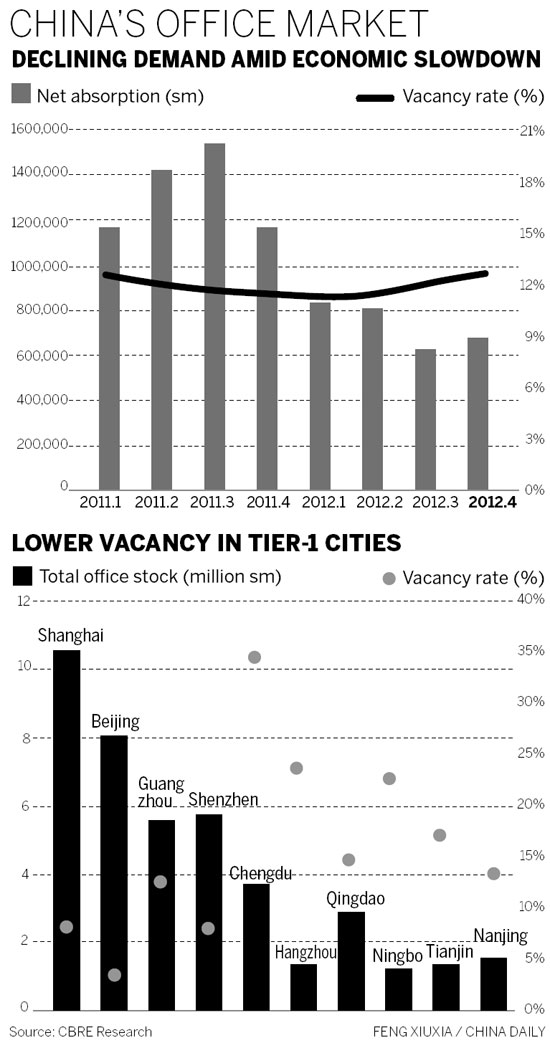

|
New office buildings under construction in Beijing. The capital's rent growth of Grade A offices is expected to slow to about 5 percent in 2013, real estate service provider Savills said in a report. Wang Heng / For China Daily |
Landlords to offer more incentives to counteract decreasing demand
Office vacancy rates in China will continue to rise in 2013, with rents under pressure after skyrocketing over the past few years, industry experts said.
International real estate service provider CBRE expects new office supply will remain abundant this year, most of it coming from emerging areas.
"Over the next few quarters, rents will be under some pressure - especially for offices located in newly developed areas," said Frank Chen, executive director of CBRE.
Beijing's rent growth of Grade A offices is expected to slow to about 5 percent in 2013, as elevated rent levels have decreased tenants' affordability dramatically over the last three years, real estate service provider Savills said in a report.
Despite limited leasable space in the market, rent growth slowed on the back of weaker demand.
Grade A office rents in Beijing increased by 0.9 percent in the fourth quarter of 2012 to 317.8 yuan ($51) per square meter per month, with annual growth falling to 13.8 percent from 44.2 percent in 2011, the report showed.
"A number of landlords began to offer more rental incentives to combat slowing demand and retain existing tenants, given the current sluggish economy," said Joan Wang, head of research at Savills Beijing.
The demand for office space across China continued to decrease in 2012 due to a sluggish economy, with net absorption falling by more than 40 percent year-on-year, statistics from CBRE showed.
In response to the slowdown of the domestic economy - compounded by a number of uncertainties in the global economy as a whole - many multinational companies suspended their expansion plans in China in 2012.
A number of Chinese companies have also slowed down the pace of their business expansion, which has had a profound impact on the office market.

From a regional perspective, the net take-up in eastern and northern China both shrank by more than 50 percent, CBRE statistics showed.
On the other hand, the market in western China stood out with an 8 percent year-on-year growth in net take-up, thanks to the central government's go-west policies as well as the ongoing development of the local office market.
In terms of supply, numerous offices that had originally been scheduled for completion in 2012 delayed their construction schedules in response to economic uncertainty both in China and abroad. This caused the amount of new supply to decrease by 30 percent year-on-year.
Against a backdrop of significant decrease in demand, vacancy rates increased to 12.8 percent in 2012, making the first rise of 1.1 percentage points year-on-year after three consecutive years of decline.
While rental growth decelerated rapidly in 2012, there was an overall year-on-year growth of 3.6 percent nationwide.
In Beijing, office rental rates experienced double-digit growth for three consecutive years because of tight supply. Among second-tier cities, Wuhan experienced double-digit growth in office rents for two years in a row, the CBRE report showed.
On the investment side, foreign investors and real estate investment trusts are expected to continue to flock to Asia's prime gateway markets this year, according to a recent report by Cushman & Wakefield.
Blackstone Group LP, one of the world's largest private equity firms, for instance, plans to raise an Asia real estate fund soon, a source close to the company told China Daily.
The real estate fund under Blackstone, together with Ting Hisin International Group, purchased an office tower block in Shanghai last year. The total investment was around 2.3 billion yuan ($369 million). The unit price was around 49,000 yuan per sq m.
Capital value and income appreciation have been on the rise thanks to solid property fundamentals since 2009 and are likely to continue along that trajectory as high occupancy and rent upturn continue to support modest capital value in most markets, the report from Cushman & Wakefield showed.
"The yield interest rate spread for core is at an all-time high in most gateway cities in the region: Singapore, Beijing, Shanghai, Tokyo, Seoul, Hong Kong, Sydney and Melbourne," said John Stinson, executive managing director for capital markets for Cushman & Wakefield, Asia-Pacific.
"With current fundamentals pointing to steady growth until 2014, we anticipate strong investment activity in the first half of 2013 throughout the region's core markets," he added.
huyuanyuan@chinadaily
